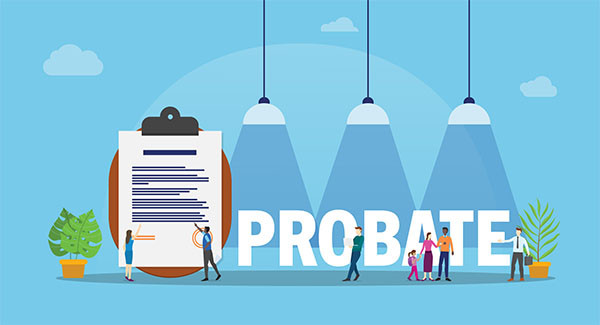How to Settle an Estate Without Losing Your Mind or Breaking Apart Your Family
If you’ve been tasked with settling the estate of a loved one, it can be an emotionally taxing and daunting process. It’s even harder when there are disagreements or issues between family members. That sounds like something no one wants to go through. But if this is your situation, don’t despair: There is hope!
Get ready to learn helpful information about how to keep communication open with family members, find legal assistance that meets your needs, avoid common pitfalls in settling an estate—all while honoring the wishes of loved ones!
As you move through the months (perhaps years) of settling an estate, you will face heavy family expectations. This article will guide you through the trickiest parts of probate, especially the emotional issues. We will show you how to spot potential flashpoints and manage them with suggestions for maintaining family relationships while keeping your own emotional health intact.
What is Probate?
In simple terms, probate is a court-supervised process during which the financial affairs of a deceased person are settled. It ensures that all assets of the deceased person are collected and that all administration fees and outstanding debts are paid.
After all assets are collected and debts paid, the Executor distributes the remaining assets according to the Will (or state laws if there is no Will). The Executor is also responsible for ensuring the deceased person’s personal taxes and estate taxes are filed and paid.
Each state has their own procedure, but they will include the same basic elements:
- Recording the Will and appointing an Executor or Administrator
- Protecting, inventorying, and collecting estate assets
- Settling estate debts (after determining the solvency of the estate)
- Managing all the estate assets, following the instructions provided in the Will or interstate law
- Submitting all required notice and filings, typically including an inventory and an Accounting
- Final Distribution of estate
How long does Probate take?
The average probate timeframe is about one year. Even the simplest estates can take months, at a minimum, to settle. Every state has its own processes and timelines for filings and allowing creditors to file a claim after someone dies.
Additionally, many states give potential heirs and beneficiaries a brief time to contest the Will or the distribution of assets. If that happens, court procedures could drag on for years – without anyone inheriting anything during that time.
Probate can be time-consuming, and beneficiaries can become frustrated waiting for their inheritance. But this legal process does give the family peace of mind that their loved one’s wishes were carried out correctly when the Executor does things properly. Plus, probate provides legal protection to prevent any type of fraud or wrongdoing by an Executor, creditors, or would-be heirs.
Executor Obligations
Executors are on the hook for following the correct process. They are tasked with fulfilling the Will to its exact specifications and requirements. If you make a mistake as an executor, you can be sued for misconduct.
Things you can be sued for as Executor:
- Not recording the Will
- Failure to find and protect the assets
- Bungling the finances
- Ignoring creditors and giving stuff away
Managing Family Reactions
During the probate process, an Executor is often immersed in stress, anxiety, fear, resentment, and frustration. Below are three common trigger points that have been seen with family fights over inheritances.
- “Mom always liked you best” – Being named Executor can feel like a vote of confidence and a validation of our relationship with the person who died. Not being asked can create resentment from others, which manifests itself as a deep distrust of the process and leads to constant questioning.
- “Fair” isn’t always equal – There’s often a gap between what beneficiaries expect to receive and what they get. The Executor has the job of distributing estate proceeds according to the Will (or according to the state law if there is no Will). If family members feel that the distribution is unfair, the Executor is the obvious, and easy, person to attack.
- Facing your judge and jury – Family members with a stake in the process – whether personal or financial – can be harsh critics. Questions can quickly escalate into accusations if they aren’t answered, or if the other beneficiaries don’t like the answers they hear.
As Executor of someone’s Will, it is hard to find time to grieve. It’s important to understand that you have a right to decline to be the Executor. The time and strain it can take on you and your family should be considered before anyone agrees.
Executor Duties
In the swirl of emotions immediately after someone dies, there are several pressing duties that Executors must manage. Some can wait, even if family members, heirs, and creditors are pushing for a resolution. Others, however, must be done within the first week – sometimes within days after a death. Here are the top Executor priorities immediately after a death.
Who Pays for the Funeral?
Rules vary state by state, but in general, the estate is responsible for paying funeral costs. Even when an estate is insolvent, meaning there are more debts than assets, funeral homes are usually at or near the top of creditors who have Priority of Payments. Even if you think you can’t afford a funeral, know that it’s one of the first bills the estate will likely pay (usually only up to a certain amount if the estate is insolvent).
Unfortunately, many funeral homes don’t want to wait for the estate to begin probate to get paid for their services. Often beneficiaries or the Executor pay for the funeral out of their own pockets, expecting it to be repaid once the estate assets are accessible.
Securing Assets
It may sound extreme, but we recommend that an Executor change the locks on the decedent’s house and other property as soon as possible. Don’t even wait to be officially qualified as Executor by the probate court. You should start securing assets immediately.
Those assets can include anything from canceling credit cards, notifying Social Security of the passing, to planning the funeral. Also, it is important to review the laws in your state surrounding notification of death to different entities.
During this process, keep the family and beneficiaries in contact with you to ensure less miscommunication. Let family members know there are some decisions that require collaboration. If you think family dynamics will complicate this process, bring in an objective third party to help mediate. And lastly, try to not let the process consume you.
Probate Paperwork
The first step of settling any estate is determining if a Will exists. If it does, you will need the original signed version – copies typically won’t hold up in court. If there is no Will, intestate laws will guide the estate settlement process.
If there is a Will, it will name an Executor. If there is no Will, the probate court will appoint an Administrator. Both have the same duties of settling the estate, and both must be “qualified” by the probate court.
It’s important to remember that every state has a different process for qualification, and some may require you to meet with an attorney for assistance.
Required Probate Documents:
- The original version of the Will
- Titles and deeds to personal property such as automobiles and real estate
- Recent bank and investment account statements
- Insurance policies and annuities
- Business ownership documents
- Appraisal valuations of high-value personal belongings such as jewelry and furniture
What if there is no Will?
If you do an exhaustive search and can’t find a Will, don’t worry. All states have laws and procedures for how to handle intestate estates (estates without Wills). The probate court appoints an estate Administrator, who has the same responsibilities as an Executor. Until that happens, just focus on compiling a complete and accurate list of the assets. Each state has laws that define how probate is to be handled if there is no Will.
After a loved one dies, it’s important to gather important documents quickly – they might accidentally get thrown away! Depending on what you find, you may discover that the estate doesn’t need to go through a lengthy probate process after all.
First Four Months: Secrets & Surprises
When you’ve been cleaning out estates for over 7 years, as we have, you learn that it’s not uncommon to uncover a shocking revelation about a deceased relative among their personal belongings. As the Executor, you must decide how to deal with these secrets.
Regardless of what you find or learn about secrets in families, it’s important you respect the privacy of those involved. Don’t spread gossip or let the news get away from you.
Share the information gently and calmly with the parties involved and choose your words wisely to ease into the topic. If you are worried about family members lashing out, consider getting a qualified third party to be present. And finally, try to refrain from sharing this news publicly on social media.
To learn more about how to get rid of a Facebook profile for your deceased loved one, read our blog here!
First Four Months: Finding and Valuing Assets
As you begin your search for assets in the house, forget checking under the mattress – have you looked inside the tank in the back of the toilet? Seniors often create secret hiding places for money. Finding their treasure troves when they’re gone requires patience and a little detective work.
A few places to look for cash:
- The toilet tank(s)
- The freezer
- The pantry
- Closets
- Old trunks
- Read more about possible hiding places here…
First Year: Distributing Assets
Your brother wants to stop by next week and pick up Dad’s workshop tools. Your sister could really use an advance on her inheritance to pay her son’s college tuition bill. It sounds reasonable, but don’t make assets distribution too early or in the wrong order.
Those mistakes may cost you, personally. During the probate process, there is a method for dividing everything among all beneficiaries. Here is how to properly distribute estate assets, including household items, real estate, and cash.
Distributing Mementos, Furniture, and Other Tangible Assets
Tangible assets are things you can physically touch that don’t have an ownership title (as real estate and bank accounts do). Examples include furniture, antiques, and jewelry. While state laws vary, in general, you can start distributing smaller specific requests after an estate inventory and appraisal are completed and solvency is determined.
These smaller bequests, often sentimental items, may be made once there’s confirmation of sufficient cash in the rest of the estate to cover any outstanding taxes and bills.
Settling Houses and Other Real Estate
If the Will identifies a specific person to inherit the property, that asset will usually pass to the named beneficiary. However, if there are outstanding debts and bequests needing to be satisfied first, those debts may force liquidation of the property.
Divvying up Cash, Stocks, and Bonds
When it comes to distributing liquid assets after probate settles, ask the beneficiaries how they would like to receive their share. Some might prefer cash, while others might want stock. If asset distribution is equitable based on the current market value of the stocks and bonds, it doesn’t matter how these are divided up.
If you distribute assets before paying off all estate debts, and the estate was to come up short in liquid assets after taxes and creditors are paid off, the Executor can be on the hook for those debts.
Everything Else…
Some estates are trickier than others and require more assistance than what has been covered here. It’s important to remember the best strategy is to try to anticipate potential problems and give beneficiaries a heads-up so they know what to expect. Open and honest communication is your best option for ensuring a smooth probate process—no matter how long it takes.
Time for Grieving
The truth is, Executors must dive quickly into the logistics after a death. Managing the complexity of “doing” doesn’t leave much emotional space for “feeling.” This doesn’t mean an Executor doesn’t feel emotions during probate, but those emotions are often pushed aside by the tasks at hand.
So, be kind to yourself during this time. If you are a shopper, treat yourself to a little retail therapy. If touch is meaningful to you, indulge in some massages. Maybe regular walks outdoors are how you relax or spending time with good friends. Whatever is meaningful to you, now is the time for a reward and your own recognition of a job well done. Self-care is truly the critical last step to probate. Learn more about settling an estate here
We hope the information and experiences provided in this blog will help individuals going through the probate process cope with their own personal needs, and that this blog provides a general understanding of what to expect while administering an estate. While our intent is to share practical guidance and information about the probate process, this blog does not provide legal advice, and the authors are not attorneys. Therefore, we strongly recommend that you seek out an attorney if you want legal advice about this process, or any particular issues involving administration of a particular estate.







